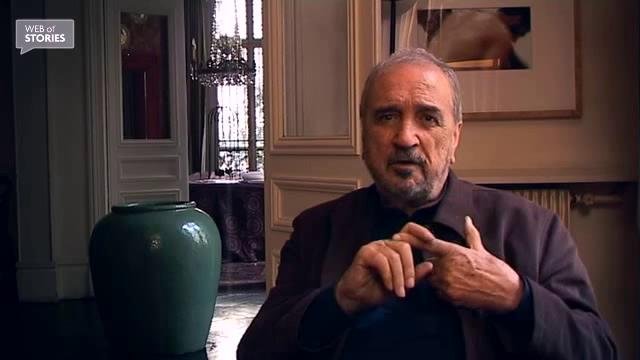NEXT STORY

'Readiness is all'
RELATED STORIES

NEXT STORY

'Readiness is all'
RELATED STORIES


|
Views | Duration | |
|---|---|---|---|
| 71. Keeping a 'book of deaths' | 144 | 02:19 | |
| 72. Storing memories | 140 | 01:19 | |
| 73. A scene observed but never used | 103 | 01:10 | |
| 74. Returning to my hotel wearing only one shoe | 184 | 01:23 | |
| 75. Editing-in the action | 158 | 01:16 | |
| 76. A library should look like its owner | 1 | 216 | 02:43 |
| 77. My drug of choice | 267 | 02:15 | |
| 78. Money: the giant octopus | 1 | 175 | 02:01 |
| 79. Expect everything from yourself | 1 | 237 | 01:31 |
| 80. 'Readiness is all' | 1 | 284 | 01:24 |

La phrase: «Attends tout de toi-même» est une phrase du Buddha, essentielle, c’est même la plus grande phrase que Buddha ait jamais dite, et qui se trouve aujourd’hui répétée sans modifications dans toutes les écoles bouddhiques quelle qu’elle soit dans le monde. C’est à l’époque où elle a été prononcée au VI siècle avant notre ère, une phrase extra-ordinaire parce que cela veut dire: «N’attends rien d’autres choses que toi, c’est à dire inutile de prier des divinités, des démons, des déesses etc. non «tout viens de toi, attends tout de toi-même». C’est une phrase admirable que l’on retrouvera plus tard sous d’autres formes: aide toi le ciel t’aidera etc. etc. Je pense qu’il a été le premier à le dire d’une façon aussi brève et catégorique. Et c’est une phrase que, de temps en temps, je me répète moi-même. Par exemple quand on fait une prière, beaucoup de gens prient Dieu qui, n’existe pas, il n’y a pas de Dieu sinon en nous même, dieu est une de nos créatures. Alors la prière bouddhique consiste à prier à soi-même, la prière que je fais, elle s’adresse à moi: Jean-Claude, donne moi aujourd’hui la force de travailler, donne moi les idées, l’inspiration dont j’ai besoin pour aller plus loin dans ce projet. Ca ne sert à rien d’appeler un démon à la rescousse, c’est moi que je dois prier. J’aime beaucoup cette attitude là.
The phrase, 'Expect everything from yourself' is from Buddha... essential. It is the greatest thing that Buddha has ever said and is still repeated today in every Buddhist school everywhere in the world. At the time he said this, in the sixth century BC, it was a extraordinary phrase because it meant, 'don't expect anything from anywhere else nor from anyone but yourself, it is useless to pray to gods and goddesses, demons... everything comes from within you, expect everything from yourself'. It is an admirable sentence that will later appear under other guises, 'heaven helps those who help themselves' and so on... I think it was the first time it was put in such a concise, categorical way. It is a sentence that, from time to time, I repeat myself. For instance, when you pray, a lot of people pray to God, who doesn't exist, there is no God, except in ourselves, God is one of our creatures. Buddhist prayer involves praying to yourself, it is directed to me, 'Jean-Claude, give me the strength today to work, give me ideas, inspire me so that I can work further on this project'. There is no point calling for some demon for help, I am the one who needs to be prayed to. I really like that way of thinking.
French screenwriter Jean-Claude Carrière (1931-2021) began his association with films aged 24 when he was selected by Jacques Tati to write for him. This early experience led to further contact with other film-makers, including Luis Buñuel with whom Carrière collaborated for many years. He wrote screenplays for films including Belle de Jour, The Discreet Charms of the Bourgeoisie, Tin Drum and Danton.
Title: Expect everything from yourself
Listeners: Andrzej Wolski
Film director and documentary maker, Andrzej Wolski has made around 40 films since 1982 for French television, the BBC, TVP and other TV networks. He specializes in portraits and in historical films. Films that he has directed or written the screenplay for include Kultura, which he co-directed with Agnieszka Holland, and KOR which presents the history of the Worker’s Defence Committee as told by its members. Andrzej Wolski has received many awards for his work, including the UNESCO Grand Prix at the Festival du Film d’Art.
Tags: Buddha
Duration: 1 minute, 31 seconds
Date story recorded: January 2010
Date story went live: 10 May 2011